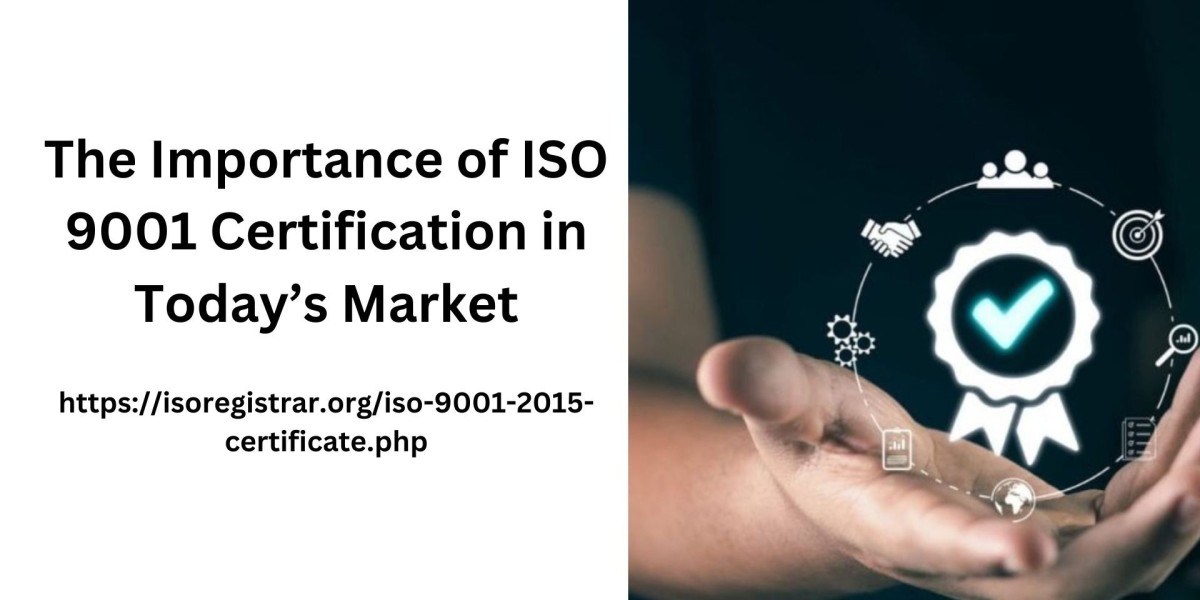In today’s competitive landscape, businesses are constantly seeking ways to enhance their operations, meet customer expectations, and achieve sustainable growth. One of the most effective tools in this pursuit is ISO 9001 certification. This internationally recognized standard for quality management systems (QMS) not only helps organizations improve their processes but also enhances their credibility in the marketplace. In this article, we will explore the significance of ISO 9001 certification in today’s market, highlighting its benefits, implementation strategies, and its role in achieving long-term success.
Understanding ISO 9001 Certification
ISO 9001 is part of the ISO 9000 family of standards, which focuses on quality management principles. It was first published in 1987 and has undergone several revisions, with the most recent version being ISO 9001:2015. The standard is designed to help organizations ensure that they consistently meet customer and regulatory requirements while continually improving their processes.
The core principles of ISO 9001 include:
Customer Focus: Organizations should understand and meet customer needs to enhance satisfaction.
Leadership: Strong leadership is essential to create an environment that supports quality.
Engagement of People: Involving all employees contributes to the effectiveness of the QMS.
Process Approach: Understanding and managing interrelated processes enhances efficiency.
Improvement: Continuous improvement should be a permanent objective.
Evidence-Based Decision Making: Decisions should be based on the analysis of data and information.
Relationship Management: Establishing mutually beneficial relationships with stakeholders enhances performance.
Enhancing Credibility and Reputation
In today’s market, credibility is paramount. ISO 9001 certification serves as a mark of quality that signals to customers, partners, and stakeholders that an organization is committed to quality management. This certification is recognized globally, allowing companies to stand out in both local and international markets.
A certified organization demonstrates to potential clients that it adheres to stringent quality standards. This can be a deciding factor in contract bids and partnerships, especially in industries such as manufacturing, healthcare, and construction, where quality and safety are critical.
Improving Operational Efficiency
One of the primary benefits of implementing ISO 9001 is the improvement in operational efficiency. By adopting a process-oriented approach, organizations can identify inefficiencies and bottlenecks in their workflows. This standard encourages businesses to map out their processes, which facilitates a clearer understanding of how different departments and functions interrelate.
As organizations streamline their processes, they can reduce waste, minimize errors, and enhance productivity. This not only leads to cost savings but also allows companies to allocate resources more effectively, ultimately driving profitability.
Boosting Customer Satisfaction
ISO 9001 places a significant emphasis on customer satisfaction. Organizations that implement this standard are required to actively seek feedback from customers and use that information to make informed decisions. This commitment to understanding and meeting customer needs results in products and services that are more aligned with market demands.
By consistently delivering high-quality products and services, organizations can build strong relationships with their customers. Satisfied customers are more likely to become repeat buyers and brand advocates, leading to increased loyalty and revenue.
Facilitating Continuous Improvement
Continuous improvement is a cornerstone of ISO 9001. Organizations are encouraged to establish a culture of ongoing evaluation and enhancement of their processes. This proactive approach not only helps in addressing existing issues but also fosters innovation.
Through regular audits and reviews, businesses can identify areas for improvement and implement changes that lead to better performance. This cycle of feedback and refinement ensures that organizations remain agile and responsive to market changes, customer feedback, and emerging trends.
Meeting Regulatory and Legal Requirements
In many industries, compliance with legal and regulatory requirements is non-negotiable. ISO 9001 certification helps organizations establish a framework for compliance by ensuring that quality management practices are integrated into their operations. This proactive stance can mitigate risks associated with non-compliance, such as fines, legal issues, and damage to reputation.
By adhering to ISO 9001 standards, businesses can demonstrate their commitment to meeting not only customer expectations but also regulatory obligations, providing additional peace of mind to stakeholders.
Enhancing Employee Engagement and Morale
A successful quality management system is built on the involvement and engagement of all employees. ISO 9001 encourages organizations to create an inclusive environment where employees feel empowered to contribute to quality initiatives. This engagement can lead to increased morale, job satisfaction, and retention rates.
When employees understand their role in the QMS and see the positive impact of their contributions, they are more likely to take ownership of their work. This sense of pride can foster a culture of quality throughout the organization.
Strengthening Supply Chain Relationships
ISO 9001 certification not only benefits the certified organization but also strengthens relationships with suppliers and partners. Many businesses prefer to work with ISO-certified suppliers, as it assures that they will receive quality products and services.
By collaborating with certified partners, organizations can enhance their overall supply chain efficiency. This synergy leads to better communication, shared goals, and a commitment to quality throughout the entire supply chain.
Note: Apply for iso 14001 certification through the iso portal
Conclusion
In an increasingly competitive and globalized market, ISO 9001 certification has become a crucial asset for organizations seeking to improve their quality management practices. The benefits of certification are multifaceted, ranging from enhanced credibility and customer satisfaction to operational efficiency and continuous improvement.
As businesses navigate the challenges of today’s environment, ISO 9001 certification provides a robust framework for achieving excellence. By committing to quality management principles, organizations can not only meet but exceed customer expectations, paving the way for sustainable growth and success in the future. Embracing ISO 9001 is not just a regulatory requirement; it is a strategic move that can propel organizations toward long-term success.






